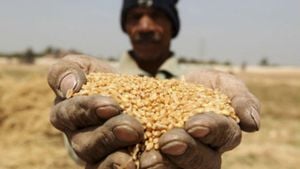Vodafone Qatar recently held its annual general assembly meeting, chaired by Akbar Al Baker, marking significant strides for the company within the telecommunications sector. During this gathering, shareholders approved all agenda items, including the board's proposal for cash dividends, which amount to 12% of the nominal value of each share, translating to 0.12 Qatari riyals per share.
The assembly, which took place yesterday, also reviewed the board of directors’ report detailing the company’s activities and financial status for the financial year ending on December 31, 2024. Shareholders not only approved the company's financial statements for the previous year but also endorsed the auditor's reports, which focused on corporate governance and internal controls related to financial reporting.
Unanimous approval was granted for the reappointment of KPMG as the company’s auditor for the 2025 financial year, which signals trust and confidence among stakeholders about the competence of the auditing firm.
During the meeting, Akbar Al Baker emphasized Vodafone Qatar's accomplishments over the past year, stating, "During 2024, Vodafone Qatar succeeded in strengthening its position as a leader in digital innovation, setting new standards for the global telecommunications sector, and enhancing the company’s innovation efforts, allowing us to launch leading products and improve customer experience." This highlights Vodafone's commitment to leveraging technology to improve connectivity and customer satisfaction.
Al Baker also reported impressive financial results, declaring, "Vodafone Qatar achieved a net profit of 601 million Qatari riyals for 2024, up 11.2% compared to the previous year, mainly attributed to growth in earnings before interest, taxes, depreciation, and amortization." He noted revenue increases, particularly within service offerings, which rose to 2.8 billion Qatari riyals, indicative of the growing demand for their telecommunications services.
These developments at Vodafone Qatar echo larger patterns of economic growth within the Arab region, as efforts strengthen to drive integration and cooperation among member states. Recently, the Arab League’s General Secretariat facilitated the 15th meeting of the Technical Committee for Arab Rules of Origin, which took place from February 25 to 27, 2025.
This meeting involved representatives from 18 Arab countries participating in the Greater Arab Free Trade Area, showcasing collaborative efforts aimed at enhancing trade relationships. Ambassador Ali bin Ibrahim Al-Maliki, Assistant Secretary-General for Economic Affairs, highlighted the significance of the topics discussed, noting the committee as central to addressing challenges faced by Arab nations concerning trade exchanges.
Al-Maliki stated the committee was analyzing proposed amendments to the rules of origin, reflecting the aim to create more fluid trade processes among member countries. The discussions also touched on advancements and responses to global trade dynamics, emphasizing the intent to ease barriers impacting trade activities.
One of the meeting's key agenda items encompassed reviewing Egypt's proposal on Article 17 of the trade agreement framework, which aims to facilitate bilateral commerce. The committee is working on refining collective regulations, with approximately 95% of the general rules already reviewed, moving toward final approval for the remaining provisions.
The outcomes of these interconnected economic discussions demonstrate the Arab countries’ focus on enhancing economic resilience under the Greater Arab Free Trade Area. This could potentially lead to greater synergy among nations and optimized benefit from existing resources.
Future movements within these economic alliances and individual corporations like Vodafone Qatar not only drive profit and shareholder satisfaction but also echo the broader narrative of economic development across the Arab world. The dialogue at such meetings allows stakeholders to navigate through the complex web of international economics efficiently, fostering growth and stability within the region.



